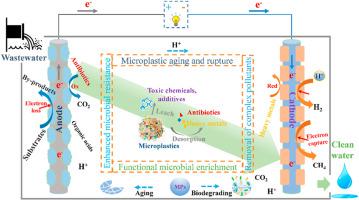当前位置:
X-MOL 学术
›
J. Clean. Prod.
›
论文详情
Our official English website, www.x-mol.net, welcomes your feedback! (Note: you will need to create a separate account there.)
Bioelectrochemical systems – A potentially effective technology for mitigating microplastic contamination in wastewater
Journal of Cleaner Production ( IF 11.1 ) Pub Date : 2024-03-25 , DOI: 10.1016/j.jclepro.2024.141931 Hui Wang , Qixing Zhou
Journal of Cleaner Production ( IF 11.1 ) Pub Date : 2024-03-25 , DOI: 10.1016/j.jclepro.2024.141931 Hui Wang , Qixing Zhou

|
Microplastics are refractory pollutants extensively present in wastewater treatment, which not only directly impact the metabolic activity of microorganisms, but also can directly or indirectly affect the environment and human health by adsorbing and releasing other pollutants in wastewater. Bioelectrochemical systems (BES), as a wastewater treatment technology of microbial metabolisms coupled with electrochemical reactions, are progressively being employed for the treatment of refractory pollutants due to their superior oxidative and reductive reaction properties. Therefore, the main focus of this review is to analyze the adverse effects of microplastics on anaerobic wastewater treatment and to explore the possibility of using BES to alleviate this pollution effect. Due to the lack of relevant literature, this review can only demonstrate the potential ways of BES to mitigate microplastic toxicity in wastewater by analyzing the detrimental effects of microplastics generated and the promoting effect of BES during the anaerobic fermentation of the wastewater. This review illustrates the possible roles of BES in microplastic-contaminated wastewater including BES accelerating the aging and decomposition process of microplastics in wastewater, BES enhancing the metabolic activity of microplastic-degrading microorganisms, BES strengthening the resistance of microorganisms to microplastics and the contaminants they release or adsorb and BES attenuating the compounding effect of other pollutants. This review is the first to explore the possibility of using bioelectrochemistry technology to mitigate microplastic contamination in wastewater. These analyses provide new insights into mitigating the adverse effects of microplastics in wastewater treatment processes.
中文翻译:

生物电化学系统——一种减轻废水中微塑料污染的潜在有效技术
微塑料是废水处理中广泛存在的难降解污染物,它不仅直接影响微生物的代谢活性,而且还可以通过吸附和释放废水中的其他污染物,直接或间接影响环境和人类健康。生物电化学系统(BES)作为一种微生物代谢与电化学反应相结合的废水处理技术,由于其优越的氧化和还原反应特性,逐渐被用于难降解污染物的处理。因此,本综述的主要重点是分析微塑料对厌氧废水处理的不利影响,并探讨利用BES缓解这种污染影响的可能性。由于缺乏相关文献,本综述只能通过分析废水厌氧发酵过程中产生的微塑料的有害影响以及BES的促进作用来论证BES减轻废水中微塑料毒性的潜在途径。本综述阐述了BES在微塑料污染废水中的可能作用,包括BES加速废水中微塑料的老化和分解过程、BES增强微塑料降解微生物的代谢活性、BES增强微生物对微塑料及其释放的污染物的抵抗力或吸附和BES减弱其他污染物的复合效应。本综述首次探讨了利用生物电化学技术减轻废水中微塑料污染的可能性。这些分析为减轻废水处理过程中微塑料的不利影响提供了新的见解。
更新日期:2024-03-25
中文翻译:

生物电化学系统——一种减轻废水中微塑料污染的潜在有效技术
微塑料是废水处理中广泛存在的难降解污染物,它不仅直接影响微生物的代谢活性,而且还可以通过吸附和释放废水中的其他污染物,直接或间接影响环境和人类健康。生物电化学系统(BES)作为一种微生物代谢与电化学反应相结合的废水处理技术,由于其优越的氧化和还原反应特性,逐渐被用于难降解污染物的处理。因此,本综述的主要重点是分析微塑料对厌氧废水处理的不利影响,并探讨利用BES缓解这种污染影响的可能性。由于缺乏相关文献,本综述只能通过分析废水厌氧发酵过程中产生的微塑料的有害影响以及BES的促进作用来论证BES减轻废水中微塑料毒性的潜在途径。本综述阐述了BES在微塑料污染废水中的可能作用,包括BES加速废水中微塑料的老化和分解过程、BES增强微塑料降解微生物的代谢活性、BES增强微生物对微塑料及其释放的污染物的抵抗力或吸附和BES减弱其他污染物的复合效应。本综述首次探讨了利用生物电化学技术减轻废水中微塑料污染的可能性。这些分析为减轻废水处理过程中微塑料的不利影响提供了新的见解。



























 京公网安备 11010802027423号
京公网安备 11010802027423号